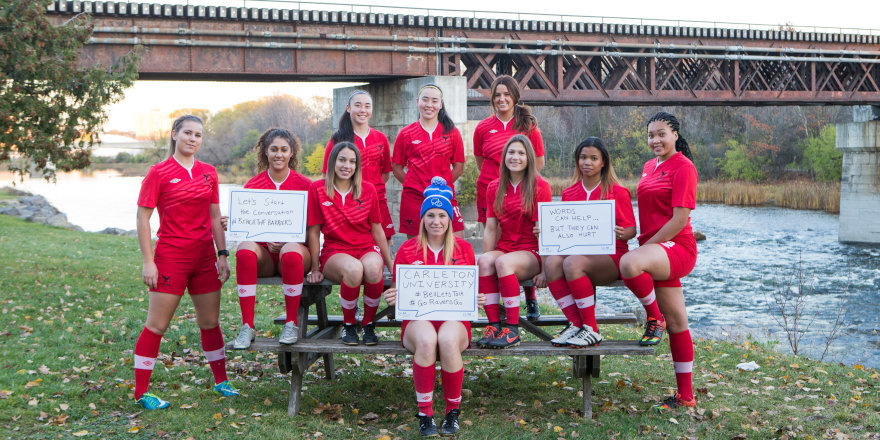
Life as a student is stressful, we have to juggle different subjects with test and projects, and maybe even work and extracurricular activities. Having a mental illness doesn't make these tasks any easier. Since stress levels in students are increasing, more than 200 Canadian post-secondary institutions are promoting Bell Let's Talk Day, which is taking place on January 30th.
What is Bell Let's Talk Day?
The Bell Let's Talk mental health initiative is focused on 4 key action pillars: Anti-stigma, Care and Access, Research and Workplace Leadership. Since its launch in September 2010, Bell Let's Talk has partnered with more than 900 organizations providing mental health services throughout Canada, including major donations to hospitals, universities and other care and research organizations.
In the lead up to Bell Let's Talk Day, university and college students in every province and territory are promoting campus mental health programs with guest speakers, conferences, information kiosks, and varsity and collegiate athletic events. More than 340 events at 205 schools will invite students to be part of the world's largest mental health conversation while learning more about resources available to them on campus.
Over the years, the Bell Let's Talk campaign has become very successful in starting the conversation about a topic that was not as popular in previous years. "With more than 200 universities and colleges part of the campaign this year, it's clear that post-secondary students in Canada have taken a real leadership role in the mental health conversation," said Mary Deacon, Chair of Bell Let's Talk. "These hundreds of student-led initiatives are growing awareness of both the impact of mental illness and the resources students can turn to for support, helping to ensure a psychologically healthy and safe environment on campus."
The campaign has made tremendous progress throughout schools across Canada.
"Our participation in the Bell Let's Talk campaign helped inspire more conversation on our campuses and the development of Nova Scotia Community College's own Mental Health Strategy," said Don Bureaux, President of Nova Scotia Community College. "Supporting mental wellness is an important part of building a healthy community. By increasing awareness and supporting those living with mental health challenges, we will foster a better learning and working environment."
"Having conversations with our student athletes about mental health and fighting the stigma around mental illness is important to Canada West," said Rocky Olfert, Managing Director of Canada West Universities Athletics Association. "We are proud to be part of the Bell Let's Talk initiative and its positive impact on students and their communities across the country."
To see a complete list of participating universities and colleges please click here.
Donations from both the campaign itself and partnerships to charities highlighting the importance of mental health have been made as well. Last May, Bell and The Rossy Foundation partnered on a joint $500,000 donation to the Fédération des CÉGEPS and the Fondation de l'Université du Québec à Montréal to improve the mental health of college students in Québec. Those funds are enabling the broader implementation and evaluation of the Zenétudes program, supporting students making the transition from secondary school to college. Furthermore, according to Canada's most recent National College Health Assessment Survey in 2016, 32% of students were diagnosed or treated for anxiety or depression in the previous year. In January 2018, Bell Let's Talk and The Rossy Foundation announced a joint $1,000,000 donation to create a national standard for post-secondary student mental health. Led by the Mental Health Commission of Canada, the project will establish mental health best practices at Canadian campuses to support student success.
How Can I Help?
On January 30, Bell will donate 5 cents to Canadian mental health programs for each of the following interactions, at no extra cost to participants beyond what they would normally pay their service provider for online or phone access:
- Talk: Every mobile and every long distance call made by Bell wireless and phone customers
- Text: Every text message sent by Bell wireless customers
- Twitter: Every tweet and retweet using #BellLetsTalk, featuring the special Bell Let's Talk emoji, and every Bell Let's Talk Day video view at Twitter.com/Bell_LetsTalk
- Facebook: Every Bell Let's Talk Day video view at Facebook.com/BellLetsTalk and every use of the Bell Let's Talk frame
- Instagram: Every Bell Let's Talk Day video view at Instagram.com/Bell_letstalk
- Snapchat: Every use of the Bell Let's Talk filter and every Bell Let's Talk Day video view
Total Bell Let's Talk Day interactions since the first event in 2011 stand at 867,449,649 and are expected to exceed 1 billion on January 30. Bell's funding commitment for mental health, including the company's donations based on Bell Let's Talk engagement and its original $50-million donation to launch the initiative, is now $93,423,628.80 and expected to surpass $100 million on January 30.
Now that you know how you can do your part in this important initiative, why not join in on the movement and spread awareness? You never know who could benefit from these resources. If you or someone you know needs support, please visit https://letstalk.bell.ca/en/get-help
To learn more, please visit Bell.ca/LetsTalk.
